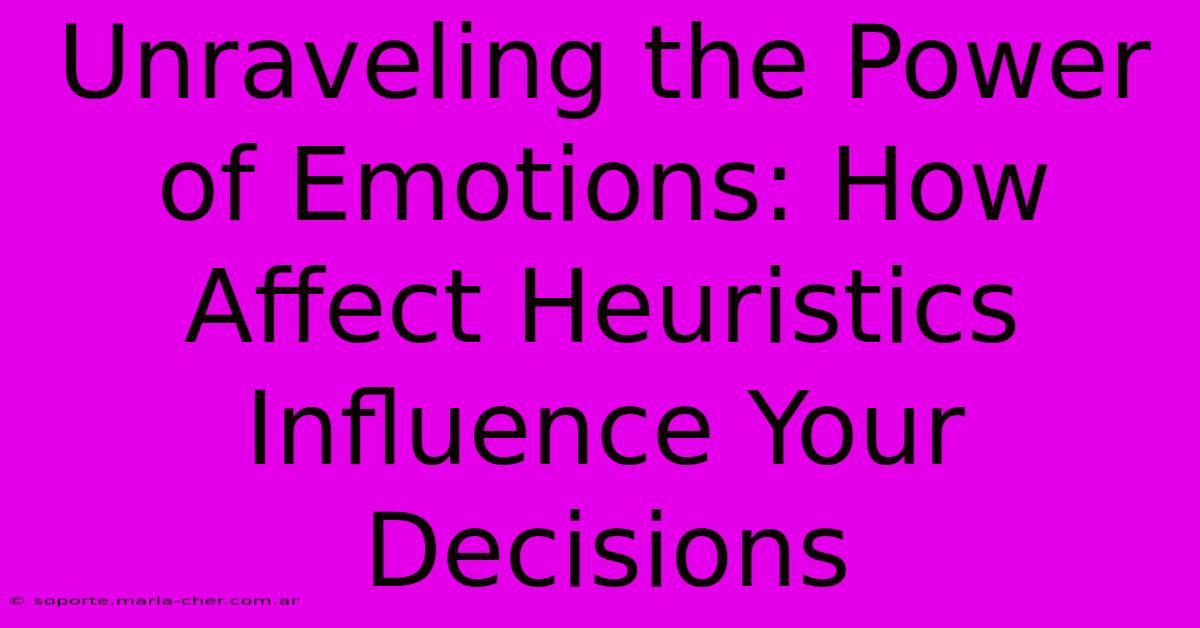Unraveling The Power Of Emotions: How Affect Heuristics Influence Your Decisions

Table of Contents
Unraveling the Power of Emotions: How Affect Heuristics Influence Your Decisions
We often pride ourselves on being rational decision-makers, carefully weighing pros and cons before making choices. But the truth is, our emotions play a surprisingly powerful role, often subtly guiding our judgments and actions. This influence is largely due to affect heuristics, a cognitive shortcut where we rely on our feelings – positive or negative – to make quick judgments. Understanding affect heuristics is key to understanding ourselves and making more informed choices.
What are Affect Heuristics?
Affect heuristics are essentially mental shortcuts that simplify complex decisions by relying on our immediate emotional responses. Instead of meticulously analyzing all available information, we quickly assess our feelings toward something and let that feeling dictate our decision. This “gut feeling” often works well in everyday situations, allowing us to make rapid judgments without cognitive overload. However, it can also lead to biases and less-than-optimal outcomes.
How Affect Heuristics Work:
The process is surprisingly simple:
- Encounter a stimulus: You encounter a product, idea, or situation.
- Experience an emotion: Your brain quickly registers a positive or negative feeling associated with that stimulus. This feeling could be based on past experiences, personal values, or even subconscious associations.
- Make a judgment: Based on that immediate emotional response, you form a judgment – positive or negative – about the stimulus.
- Take action: This judgment then influences your decision-making process. If you feel positive, you're more likely to approach it; if negative, you're more likely to avoid it.
For example, imagine choosing between two brands of coffee. If you've had a positive experience with Brand A in the past (perhaps it reminds you of a cherished memory), you're more likely to choose it again, even if Brand B has slightly better objective qualities. Your positive affect towards Brand A overrides a rational comparison.
The Impact of Affect Heuristics on Decision-Making
While often unconscious, the effects of affect heuristics are far-reaching:
- Risk Perception: Affect heuristics significantly influence how we perceive risk. We tend to overestimate risks associated with things that evoke negative emotions (e.g., nuclear power) and underestimate risks associated with things that evoke positive emotions (e.g., driving a car).
- Product Choices: Marketing heavily leverages affect heuristics. Advertisements often aim to create positive associations with their products through appealing imagery, music, and emotional storytelling.
- Political Attitudes: Our emotional responses to political candidates and their platforms significantly impact our voting choices. A candidate who evokes strong positive feelings is more likely to receive our vote, regardless of their policy positions.
- Financial Decisions: Investing decisions are frequently driven by emotions. Fear and greed can lead to impulsive buying and selling, often resulting in poor financial outcomes.
Mitigating the Influence of Affect Heuristics
While we can't completely eliminate the influence of affect heuristics, we can become more aware of their impact and take steps to make more rational decisions:
- Increase self-awareness: Pay attention to your emotional responses to different situations. Ask yourself: "What is the source of this feeling?" and "Is this feeling influencing my decision in a way I'm comfortable with?"
- Seek objective information: Don't rely solely on your gut feeling. Gather objective data and carefully consider all relevant information before making important decisions.
- Delay your decision: Sometimes, taking a break and revisiting a decision later can allow emotions to subside, leading to a more rational outcome.
- Consider the opposing viewpoint: Actively challenge your initial emotional response by considering the opposite perspective. This can help identify biases and promote more balanced decision-making.
Conclusion: Harnessing the Power of Emotion Intelligently
Affect heuristics are a fundamental aspect of human cognition. While they can lead to biases and poor decisions, understanding their mechanisms empowers us to make more informed choices. By increasing self-awareness, seeking objective information, and employing conscious strategies, we can harness the power of emotion intelligently, navigating the complexities of decision-making with greater clarity and control. The key is not to eliminate emotions entirely, but to manage their influence effectively.

Thank you for visiting our website wich cover about Unraveling The Power Of Emotions: How Affect Heuristics Influence Your Decisions. We hope the information provided has been useful to you. Feel free to contact us if you have any questions or need further assistance. See you next time and dont miss to bookmark.
Featured Posts
-
Sewing Seeds Of Doubt Sewed Or Sowed The Language Enigma
Feb 07, 2025
-
From Couch Potato To Action Hero How To Break Free From Passivity
Feb 07, 2025
-
Elevate Your Photography To New Heights The Best 50mm F 1 8 E Mount Lens Exposed
Feb 07, 2025
-
Unlock The Secrets Of Stunning Ai Generated Photos The Ultimate Guide To Lumi
Feb 07, 2025
-
The Financial Burden Of Heart Attacks In Virginia Calculate Your Risk
Feb 07, 2025
